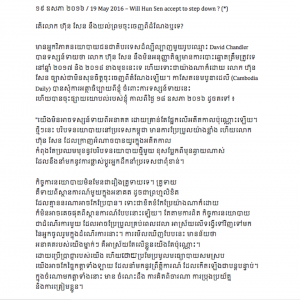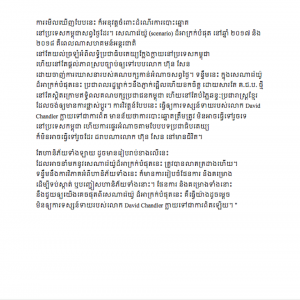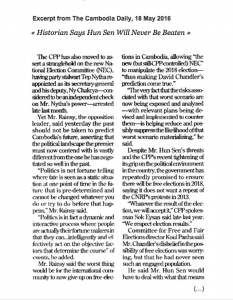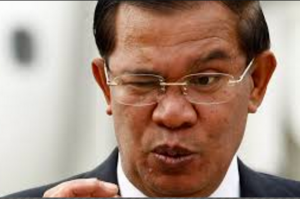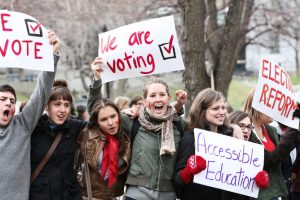
Dear Esteemed Members,
I have tremendously learned from this discussion. Observing since my teen to present adulthood, the static of influencing the youth and framing on their future shape is remained intact. Hence, the current exit passage of the youth through new mean of social media shall result in a disorganized outcome.
1. Recalling my teen, i was influenced by parents, school teachers, community elders and political figures. My single mother encouraged me to work hard on school while she discouraged me from involvement with politics or social issues. Seeing with her own eyes of bitter social upheaval, she randomly warned me of don’t talk what you see, don’t say what you want, and she told to grow Ko tree and sesame plant to keep blind eyes and mute mouth with all political issues. At school, i was taught to use guns, to disassemble and assemble guns, and teachers instructed about crimes of Pol Pot, Kiev Samphan, and Ieng Sari, the teachers boasted confidently without any interruption on the political ideology of Max-Leninism in classrooms. At community, i was bullied by adults in a daily basis. Like i wrote in previous email, beside of instructing to use different tricks of zero sum game to overcome rivals, those adults repeated the phrase of “don’t teach all knowledge to your students because those students could topple you at the end”. I highly praised Premier Hun Sen through his speech played on public loud speakers about negotiations with Prince Norodom Sihanouk at the time.
2. I am remained disappointed to the popular proverb of “young bamboo shoots shall take turn from old bamboos” or “unity is power” while the mechanisms to make them happen are not designed or incentivized to design. Parenting lessons are not taught to students, to pedagogical courses, and to parents. Political system is vastly patron-clientalism in which has placed the learned and the merits-based culture at the marginalized spot. The national institution has not been established and often been ruined by the embedded cult of god-king. The present emerge of youth participation in politics is not regulated. It has been disincentivized by the institution.
3. The world and civilized states are embracing modern “growth mindset” while Cambodia is strongly seen in attaching to “fixed mindset”. When growth mindset praised someone on their efforts, accepting individual limitation, and to give up or sacrifice power as suitable time arrived, Cambodians are praising those with light skin with luxurious commodity and longed power status, or they are not been reluctant to admire their good Kamma accumulated in past life so that they could enjoy it at the present time without obstruction etc. Instead of saying “keep on trying with this work”, Cambodian teachers might say “you are very smart” to their students.
4. According to figures by international researches, Cambodia has been well off in building up fat body but paralyzing citizenship’s mind. For instance, ADB praised 7 digits of annual growth and sometime named Cambodia as “tiger” but corruption and freedom of speech which are vibrant cells of blood and mind have been gradually paralyzed and inflicted adding on to the existing traumas. Youths are believed becoming byproducts of these paralyzing and inflicting machine.
Buddha taught “all things are interconnected and inseparable (Pathiccasammudphatha)” as Nama (mind) and Rupa (body) are inseparable component of LIFE.


